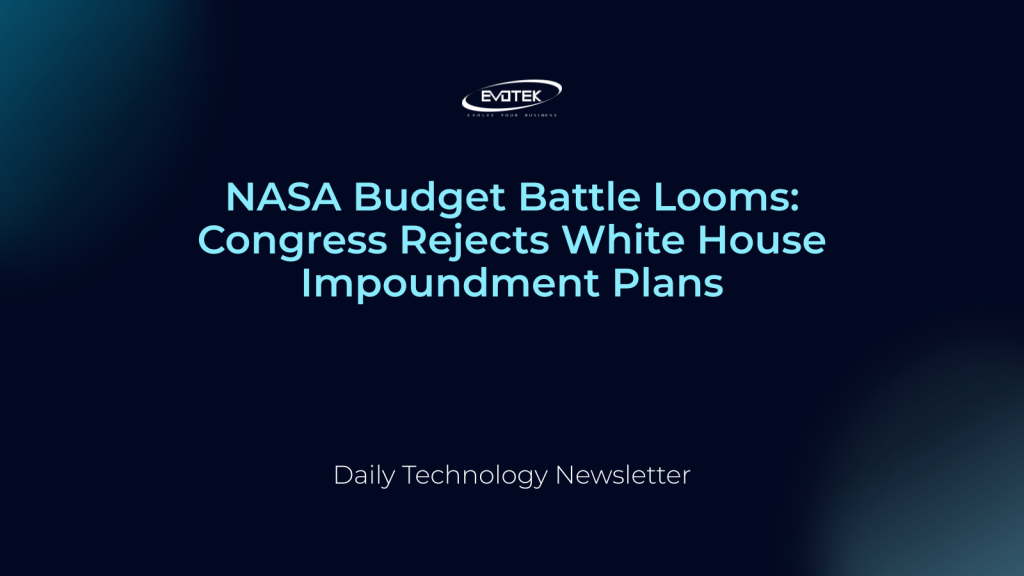The U.S. space agency, NASA, recently received positive news regarding its federal budget for the upcoming fiscal year. Both the House and Senate committees have independently passed budget bills proposing around $24.8 billion and $24.9 billion respectively for NASA. These figures largely align with the current fiscal year’s funding levels, aiming to keep ongoing space programs on their established trajectories.
However, these legislative efforts are not yet final. The bills must navigate through full House and Senate votes, undergo reconciliation, and ultimately await the President’s signature. With fiscal year 2026 commencing on October 1st, time is a critical factor.
Congressional Rejection of White House Cuts
The proposed congressional funding stands in direct contrast to the Trump Administration’s earlier call for significant cuts to NASA’s budget, including a one-quarter overall reduction and a drastic halving of scientific programs. Furthermore, Congress has dismissed the White House’s desire to overhaul the Artemis Moon program, which included eliminating the Lunar Gateway and discontinuing the use of the costly Space Launch System (SLS) rocket and Orion spacecraft after just two more flights.
While this bipartisan support offers a degree of relief to the space community, underlying tensions persist. The stage is set for a potential confrontation this fall with the White House Office of Management and Budget (OMB), with some congressional members already preparing for a rigorous defense of NASA’s funding.
The Threat of Impoundment
Typically, Congress is responsible for setting federal spending levels. Although timely appropriations bills are rare, the current legislative progress suggests a concerted effort to pass a budget before the fiscal year ends. This urgency stems from a serious threat: the White House and OMB, led by Russ Vought, have indicated plans to implement the President’s significantly lower budget request for federal agencies, including NASA, if a comprehensive appropriations bill isn’t passed.
Reports earlier this month revealed that principal investigators of NASA science missions targeted for termination by the White House have been instructed to develop shutdown plans, effective as early as October 1st. This suggests the administration might pursue legal avenues to enforce its spending priorities, regardless of a continuing resolution or even a government shutdown.
Congress Sounds the Alarm
Congressional leaders are taking the impoundment threat seriously. Ranking members of the House committee overseeing NASA publicly raised concerns in a letter to Sean Duffy, the recently named interim administrator of NASA and Secretary of Transportation.
The letter accused NASA of “acting in accordance with a fringe, extremist ideology emanating from the White House Office of Management and Budget that asserts a right to impound funds appropriated by Congress.” It highlighted fears of “mass layoffs, widespread program terminations, and the possible closure of critical centers and facilities” due to the agency’s apparent intention to implement unfunded budget cuts.
Lawmakers firmly reminded Duffy that Congress holds the power of the purse and that federal agencies must adhere to congressionally mandated budget levels. They cited ongoing funding freezes and employee reductions within the agency, noting approximately 2,700 departures since the Trump Administration began.
The legislators demanded a public commitment from Duffy, affirming that NASA would “spend all congressionally appropriated funds in recent, current, and future fiscal years as directed by Congress, and will not impound any funding.” This sentiment was echoed in another letter sent to Duffy by over five dozen House Representatives, collectively expressing alarm over the White House’s perceived attempt to bypass the normal budget process.
Legislative Strategy and Outlook
Sources close to the matter indicate that the recent swift budget action in both the House and Senate underscores Congress’s serious apprehension regarding OMB’s impoundment threat. Passing a timely budget is seen as Congress’s strongest defense in this looming conflict.
Privately, lawmakers are signaling their resolve to protect NASA’s budget. Interim Administrator Duffy has reportedly begun meeting with members of Congress whose states have significant NASA interests. Many of these lawmakers have expressed strong opposition to the White House’s unilateral plans to dramatically restructure the space agency. Notably, Senator Ted Cruz (R-Texas), Chairman of the Senate Committee on Commerce, Science, and Transportation, recently advanced a bill supporting NASA’s existing plans, positioning himself as a key advocate for the agency.
The extent to which the Trump Administration will pursue its vision for NASA remains uncertain. The question is whether the administration and OMB Director Russ Vought are willing to engage in a protracted battle over these budget priorities, especially after key figures associated with initial grand plans for Mars and leadership nominations have departed. While Congress has pushed back decisively this week, the final word on NASA’s future funding and direction is yet to be written.

 日本語
日本語 한국어
한국어 Tiếng Việt
Tiếng Việt 简体中文
简体中文